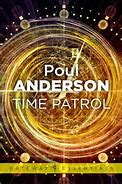"'Cut out that shimmy...'" (Time Patrol, p. 65)
Having googled this word, I am still not sure what he meant by it.
The proverbially rich Croesus tells Everard that Cyrus' life was threatened in infancy but that he was hidden and grew up as a herdsman until he could come forth, attested by signs. After hearing this:
"Everard lay quiet on the couch for a while. He heard autumn leaves rustle dryly in the garden, under a cold wind." (p. 73)
The cold autumn wind underlines the mystery of what he has heard. He must ask:
"'This is true, and no fanciful gossip?'" (ibid.)
Yes, it is confirmed by Cyrus and by others who were involved, all of them Persians fanatical about truthfulness.
"...yet Everard had heard nothing so fantastic in all his Patrol career." (ibid.)
It is the hero myth told by Herodotus of Cyrus but also told of many others. Everard/Anderson lists three but we can think of more, including the central figure of Matthew's Gospel. That cold wind sounds as if blows from the same source as such legendary stories.
When Everard finds a slave girl waiting in his room, he tells us one of the lessons learned by time travelers:
"A man had to take whatever the gods offered him, and they were a miserly lot." (p. 74)

5 comments:
My two dictionaries both include "vibration" or "wobble" among definitions for "shimmy." And in the paragraph just before the quote, the last sentence notes that Cynthia "was beginning to tremble."
David,
Right. Thanks.
Paul.
Kaor, Paul!
But I believe Our Lord's life was TRULY menaced or threatened by a paranoid King Herod. What we know of the undeniably able and even magnificent Herod from the works of Flavius Josephus and other writers was that he was certainly cruel enough to seek Our Lord's life (and ordering the massacre of the Innocents when Herod was balked in that). Recall, Herod did not hesitate to strike down at least two of his own sons.
Sean
Sean,
Matthew has the family fleeing south whereas Luke has them presenting the baby in the Temple. I think that these are legendary infancy stories rather than history.
Paul.
Sean,
Matthew thought that he had to interpret OT passages as prophesying Christ whereas "I have called my son out of Egypt" referred to Moses leading the slaves out, "A young woman (not virgin) will give birth..." referred to an event at the time it was said, "He will be called a Nazarene" is not in the OT.
In haste,
Paul.
Post a Comment